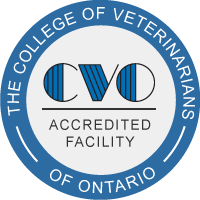Congratulations on your new kitten! Thank you for choosing us to help protect and care for your new addition to your family.
The first few months are a critical period in your kitten’s development, and we can give you the support and tools necessary to help him or her grow into a well-mannered, healthy cat, including information and advice on nutrition, litterbox training, spaying/neutering and behaviour.
Schedule your kitten for his or her first exam between 6-9 weeks old. Until your kitten has received a series of vaccines, he or she is susceptible to many serious but preventable diseases. We will vaccinate your new kitten against rabies, rhinotracheitis, panleukopenia, calicivirus (feline distemper) and feline leukemia (FeLV) between 6-18 weeks. Depending on your cat’s risk, we may also advise vaccinating him or her against other diseases such as feline immunodeficiency virus (FIV). During this time we also recommend a feline viral screen which will test your kitten for FeLV, FIV and heartworm,
It is important that you make each appointment during your kittens’s vaccine series in the time specified by your veterinarian (every 3-4 weeks) to make sure your kitten’s health is not endangered. If boosters are missed by an extended period of time, further vaccines will be recommended.
Most kittens are born with roundworms, which are intestinal worms that can cause coughing, weight loss, and a potbellied appearance in cats (although they may not cause any symptoms). It is important for kittens to be treated for roundworms, not only to help rid them of the infection but also to prevent you and the rest of your family from becoming infected. Roundworms are a zoonotic parasite, which means they can be transmitted from pets to people. By ensuring that your kitten is treated, you can keep your entire family safe. Roundworms are common in young cats and since deworming is a safe and common practice, we will commonly deworm at the first visit even without a fecal test.
A fecal test is performed to determine the specific parasite present. There are parasites other than roundworms that can cause similar symptoms and can even cause your kitten to become ill. Performing a fecal test will allow us to treat your kitten accordingly based on the type of parasite present. Although some worms are visible to the naked eye, most worm burdens are diagnosed by examining the stool of your kitten microscopically.
Since every vaccine protocol is specially tailored to your individual kitten, we do not offer generalized ‘kitten packages’.

